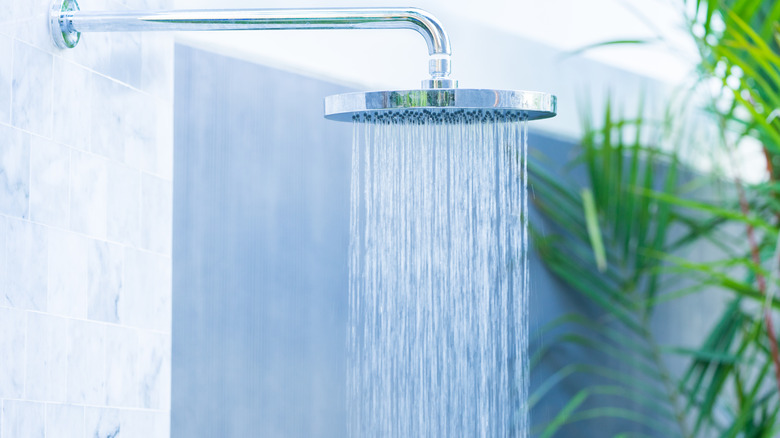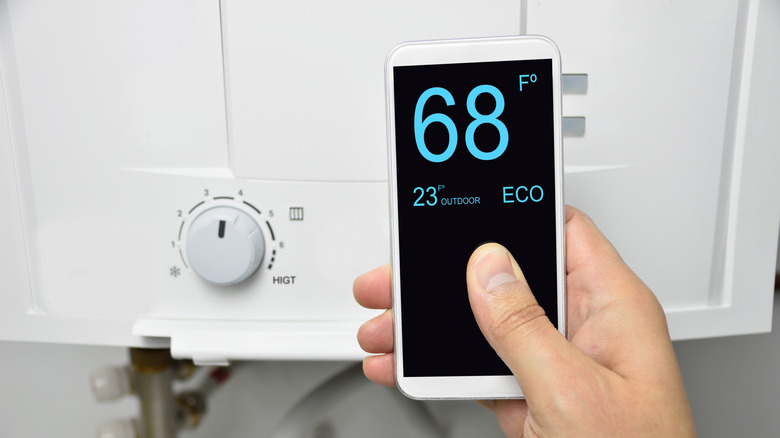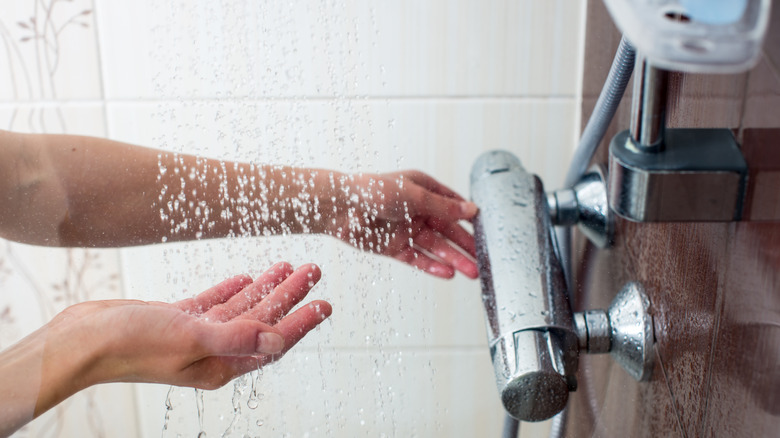What Shower Temperature Is Best For Post-Workout Recovery?
There's something rewarding about hopping into the shower after a sweaty workout session. Maybe it's the fact that showering cleanses your body of unwanted bacteria and germs, prevents clogged pores, and enhances your immune system (per Healthline). Or maybe it's gratifying to let the water temperature (hot or cold) massage and soothe your tired muscles. Many workout enthusiasts swear by the benefits of hot and cold therapy when it comes to muscle recovery, but how does this play out in the shower?
Showering isn't a miracle worker for post-workout recovery, but it can speed up recovery somewhat. But, how? After working out, your muscles contain lactic acid, which contributes to soreness. According to Healthline, when you shower, this natural chemical leaves your muscles, helping you bounce back faster. Nevertheless, this recovery depends on the temperature.
Typically, hot and steamy settings are associated with relaxation and offer many health benefits. Take saunas and steam rooms as a prime example. According to the American Journal of Physiology, relaxing in a sauna post-workout lowers cholesterol, reduces blood pressure, and improves heart health. Many experts believe hot showers function in a similar fashion for workout recovery, as heat is well-known to increase circulation and blood flow, points out Shape. Plus it generally feels good to have your sore muscles lightly massaged with hot water. But beyond feeling good, there's not enough evidence to suggest hot showers give muscle recovery an edge.
Benefits of a post-workout cold shower
If you prefer hopping into a cold shower post-workout, you may have better luck with recovery. One 2019 study reported that cold showers can help recovery after working out in hot environments. During the study, researchers examined nine healthy males who performed high-intensity cycling for 45 minutes in the heat. What the researchers found was that cold showers had the ability to quickly reduce cardiac stress and lower heart rates after working out. This is because exercise in hot environments causes your blood to be shared simultaneously among your heart, skin, and muscle, points out Runner's World. And, cold water cools each of these down the fastest. But why?
Exposure to cold water is not only refreshing, but it has the opposite impact of heat. Instead, cold temperatures slow blood flow to the body because blood vessels are constricted (via Shape). This process is called vasoconstriction. According to Aaron Drogoszewski, a NASM-certified personal trainer, "This increased demand strengthens the heart and blood vessels, translating to improved circulation longer term" (via Runner's World). This reduction in blood flow from cold water immersion may also help ease soreness and limit muscle swelling and inflammation caused by working out, shares Journal of Physiology. Still, more research is needed to confirm the impact of cold showers on muscle recovery.
Which is actually best for health?
If you're hopping in the shower right after a workout, you're already one step ahead. Showering — whether you're a fan of hot or cold temperatures – is essential for great hygiene and post-workout recovery. According to Healthline, showering (at any temperature) helps naturally lower your core temperature and heart rate.
In addition, there's one other option to consider when it comes to showering temperature rituals — contrast water therapy. Shape describes this showering technique as switching rapidly between intervals of hot and cold water to improve blood flow and circulation. This technique is age-old and is a form of hydrotherapy. It's meant to speed up muscle recovery, aid stiff joints, and treat damaged or sore muscles (per WebMD). However, research is limited around the benefits of hydrotherapy — and even more so around how to use it as a recovery tool.
But if you're looking for a clear winner, the placebo effect may be to blame (or thank). "Expectation is very powerful and in some cases, has shown similar analgesic [pain-relieving] effects to active therapies like topical agents," explains Dr. Corey Simon, an assistant professor in the Department of Orthopedic Surgery at the Duke School of Medicine, to Shape. So if you deeply believe a hot or cold shower boosts workout recovery, it most likely will. If you're looking for a science-backed post-workout recovery tool to enhance performance instead, an ice bath may do the trick.



